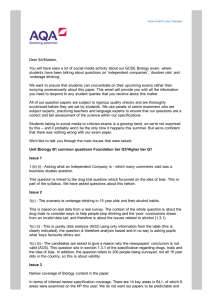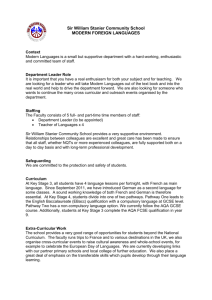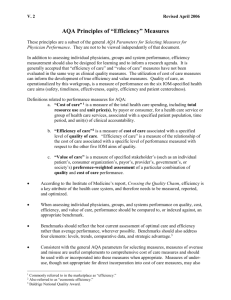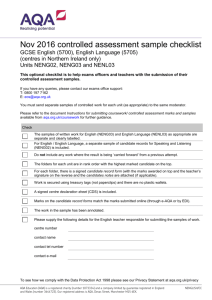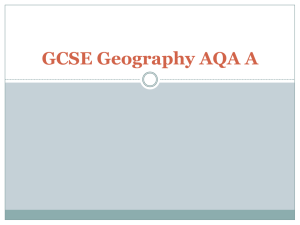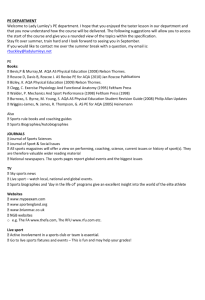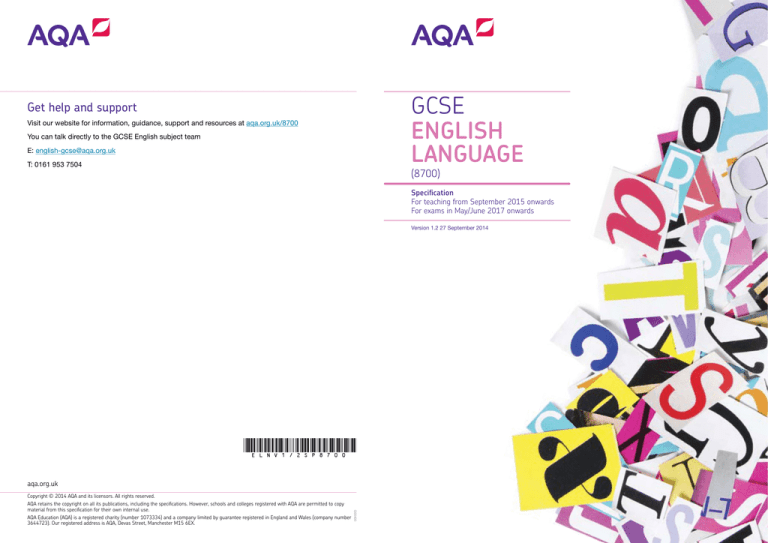
GCSE
English
language
Get help and support
Visit our website for information, guidance, support and resources at aqa.org.uk/8700
You can talk directly to the GCSE English subject team
E: english-gcse@aqa.org.uk
T: 0161 953 7504
(8700)
Specification
For teaching from September 2015 onwards
For exams in May/June 2017 onwards
Version 1.2 27 September 2014
(elNv1/2sp8700)
aqa.org.uk
G00400
Copyright © 2014 AQA and its licensors. All rights reserved.
AQA retains the copyright on all its publications, including the specifications. However, schools and colleges registered with AQA are permitted to copy
material from this specification for their own internal use.
AQA Education (AQA) is a registered charity (number 1073334) and a company limited by guarantee registered in England and Wales (company number
3644723). Our registered address is AQA, Devas Street, Manchester M15 6EX.
GCSE English Language (8700). For exams May/June 2017 onwards. Version 1.2
Contents
1Introduction
5
1.1 Why choose AQA for GCSE English Language
1.2 Support and resources to help you teach
2 Specification at a glance
3 Subject content
8
10
3.1 Scope of study
10
4 Scheme of assessment
4.1 4.2 4.3 4.4 4.5 4.6 5
6
Aims and learning outcomes
Explorations in creative reading and writing
Writers’ viewpoints and perspectives
Non-exam assessment
Assessment objectives
Assessment weightings
12
12
13
13
14
14
15
5 Non-exam assessment administration 16
6 General administration
6.1 6.2 6.3 6.4 6.5 6.6 6.7 6.8 Entries and codes
Overlaps with other qualifications
Awarding grades and reporting results
Re-sits and shelf life
Previous learning and prerequisites
Access to assessment: diversity and inclusion
Working with AQA for the first time
Private candidates
17
17
17
17
17
18
18
19
19
Visit aqa.org.uk/8700 for the most up-to-date specifications, resources, support and administration
3
Are you using the latest version of these specifications?
•• You will always find the most up-to-date version of this specification on our website at
aqa.org.uk/8700
•• We will write to you if there are significant changes to this specification.
4
Visit aqa.org.uk/8700 for the most up-to-date specifications, resources, support and administration
GCSE English Language (8700). For exams May/June 2017 onwards. Version 1.2
1Introduction
1.1 Why choose AQA for GCSE English Language
A specification designed for you and your students
Our assessments have been designed to inspire and motivate students, providing appropriate stretch
and challenge whilst ensuring, as far as possible, that the assessment and texts are accessible to the
full range of students.
The specification will enable students of all abilities to develop the skills they need to read, understand
and analyse a wide range of different texts covering the 19th, 20th and 21st century time periods as
well as to write clearly, coherently and accurately using a range of vocabulary and sentence structures.
Dynamic and engaging content
The specification offers the attraction of two equally-balanced papers, relating reading sources to
the topic and theme of writing tasks. The reading sources act as stimulus for writing tasks, providing
students with a clear route through each paper.
Each paper has a distinct identity to better support high quality provision and engaging teaching and
learning. Paper 1, Explorations in Creative Reading and Writing, looks at how writers use narrative and
descriptive techniques to engage the interest of readers. Paper 2, Writers' Viewpoints and Perspectives,
looks at how different writers present a similar topic over time.
Our approach to spoken language (previously speaking and listening) will emphasise the importance of
the wider benefits that speaking and listening skills have for students. The endorsed unit will draw on
good practice to suggest how engaging formative tasks can lead to a single summative assessment.
Skills-based approach
The specification offers a skills-based approach to the study of English Language in an untiered
context. Questions are designed to take students on an assessment journey through lower tariff tasks
to more extended responses.
Teach Language and Literature together
The specification is fully co-teachable with GCSE English Literature. Students who choose to study
both will benefit from the transferable skills developed across the two subjects.
We’re behind you every step of the way
After careful consultation with practising teachers, subject associations and employers, we have
designed the specification to meet the needs of students and teachers, providing high quality
assessment and good provision for English. It offers excellent preparation for AS and A-level English,
as well as equipping students with essential life-skills and the best progression route to future
employment.
With AQA you can rest assured that your students will receive the grade that fairly represents their
attainment and reflects the skills that they have demonstrated.
You can find out about all our English qualifications at aqa.org.uk/english.
Visit aqa.org.uk/8700 for the most up-to-date specifications, resources, support and administration
5
1.2 Support and resources to help you teach
We know that support and resources are vital for your teaching and that you have limited time to find
or develop good quality materials. So we’ve worked with experienced teachers to provide you with a
range of resources that will help you confidently plan, teach and prepare for exams.
Teaching resources
We have too many English Language resources to list here so visit aqa.org.uk/8700 to see them all.
They include:
•• English Language reading support booklet. This will include a wide range of texts from the 19th, 20th
and 21st century and some suggested teaching activities to support you in preparing students for
the reading sections of both papers
•• a KS3 resource about 19th century texts helping you to develop progression through KS3 into KS4
•• a digital anthology which will include resources to support the teaching of English Language and
English Literature
•• provision of resources to teach speaking and listening skills, in recognition of the wider benefits that
these skills have for your students
•• marked and annotated student responses to the questions on our specimen papers with senior
examiner commentaries
•• Subject Advocates who will support you in the transition to the new specification and facilitate local
and regional network and update meetings
•• student textbooks and digital resources that have been checked and endorsed by AQA
•• training courses to help you deliver AQA GCSE English Language and GCSE English Literature
qualifications
•• subject expertise courses for all teachers; from newly-qualified teachers who are just getting started
to experienced teachers looking for fresh inspiration.
Preparing for exams
Visit aqa.org.uk/8700 for everything you need to prepare for our exams, including:
•• past papers, mark schemes and examiners’ reports
•• specimen papers and mark schemes for new courses
•• Exampro: a searchable bank of past AQA exam questions
•• exemplar student answers with examiner commentaries.
Analyse your students' results with Enhanced Results Analysis (ERA)
Find out which questions were the most challenging, how the results compare to previous years and
where your students need to improve. ERA, our free online results analysis tool, will help you see where
to focus your teaching. Register at aqa.org.uk/era
For information about results, including maintaining standards over time, grade boundaries and our
post-results services, visit aqa.org.uk/results
6
Visit aqa.org.uk/8700 for the most up-to-date specifications, resources, support and administration
GCSE English Language (8700). For exams May/June 2017 onwards. Version 1.2
Keep your skills up to date with professional development
Wherever you are in your career, there’s always something new to learn. As well as subject-specific
training, we offer a range of courses to help boost your skills:
•• improve your teaching skills in areas including differentiation, teaching literacy and meeting Ofsted
requirements
•• help you prepare for a new role with our leadership and management courses.
You can attend a course at venues around the country, in your school or online – whatever suits your
needs and availability. Find out more at coursesandevents.aqa.org.uk
Get help and support
Visit our website for
information, guidance,
support and resources at
aqa.org.uk/8700
You can talk directly to the
English Language subject team
E: english-gcse@aqa.org.uk
T: 0161 953 7504
Visit aqa.org.uk/8700 for the most up-to-date specifications, resources, support and administration
7
2 Specification at a glance
Subject content
1
Explorations in creative reading and writing (page 13)
2
Writers' viewpoints and perspectives (page 13)
3
Non-exam assessment (page 14)
For the award of the GCSE in English Language students must offer all three assessments.
8
Visit aqa.org.uk/8700 for the most up-to-date specifications, resources, support and administration
GCSE English Language (8700). For exams May/June 2017 onwards. Version 1.2
Assessments
All texts in the examination will be unseen.
Paper 1: Explorations
in Creative Reading and
Writing
+
Paper 2: Writers'
Viewpoints and
Perspectives
+
Non-examination
Assessment: Spoken
Language
What's assessed
What’s assessed
What's assessed
Section A: Reading
•• one literature fiction text
Section B: Writing
•• descriptive or narrative
writing
Section A: Reading
•• one non-fiction text and
one literary non-fiction text
Section B: Writing
•• writing to present a
viewpoint
(AO7–AO9)
•• presenting
•• responding to questions
and feedback
•• use of Standard English
Assessed
Assessed
Assessed
•• written exam: 1 hour 45
minutes
•• 80 marks
•• 50% of GCSE
•• written exam: 1 hour 45
minutes
•• 80 marks
•• 50% of GCSE
•• teacher set throughout
course
•• marked by teacher
•• separate endorsement
(0% weighting of GCSE)
Questions
Questions
Reading (40 marks) (25%)
– one single text
•• 1 short form question
(1 x 4 marks)
•• 2 longer form questions
(2 x 8 marks)
•• 1 extended question
(1 x 20 marks)
Writing (40 marks) (25%)
•• 1 extended writing
question (24 marks for
content, 16 marks for
technical accuracy)
Reading (40 marks) (25%)
– two linked texts
•• 1 short form question
(1 x 4 marks)
•• 2 longer form questions
(1 x 8, 1 x 12 marks)
•• 1 extended question
(1 x 16 marks)
Writing (40 marks) (25%)
•• 1 extended writing
question (24 marks for
content, 16 marks for
technical accuracy)
Visit aqa.org.uk/8700 for the most up-to-date specifications, resources, support and administration
9
3 Subject content
Students will draw upon a range of texts as reading stimulus and engage with creative as well as real
and relevant contexts. Students will have opportunities to develop higher-order reading and critical
thinking skills that encourage genuine enquiry into different topics and themes.
This specification will ensure that students can read fluently and write effectively. Students will be able
to demonstrate a confident control of Standard English and write grammatically correct sentences,
deploying figurative language and analysing texts.
For GCSE English Language students should:
•• read fluently, and with good understanding, a wide range of texts from the 19th, 20th and 21st
centuries, including literature and literary non-fiction as well as other writing such as reviews and
journalism
•• read and evaluate texts critically and make comparisons between texts
•• summarise and synthesise information or ideas from texts
•• use knowledge gained from wide reading to inform and improve their own writing
•• write effectively and coherently using Standard English appropriately
•• use grammar correctly and punctuate and spell accurately
•• acquire and apply a wide vocabulary, alongside a knowledge and understanding of grammatical
terminology, and linguistic conventions for reading, writing and spoken language
•• listen to and understand spoken language and use spoken Standard English effectively.
GCSE English Language is designed on the basis that students should read and be assessed on highquality, challenging texts from the 19th, 20th and 21st centuries. Each text studied must represent a
substantial piece of writing, making significant demands on students in terms of content, structure
and the quality of language. The texts, across a range of genres and types, should support students
in developing their own writing by providing effective models. The texts must include literature and
extended literary non-fiction, and other writing such as essays, reviews and journalism (both printed
and online). Texts that are essentially transient, such as instant news feeds, must not be included. The
number and types of texts, and their length, are not prescribed.
3.1 Scope of study
This GCSE specification in English Language will require students to study the following content:
3.1.1 Critical reading and comprehension
•• critical reading and comprehension: identifying and interpreting themes, ideas and information in
a range of literature and other high-quality writing; reading in different ways for different purposes,
and comparing and evaluating the usefulness, relevance and presentation of content for these
purposes; drawing inferences and justifying these with evidence; supporting a point of view by
referring to evidence within the text; identifying bias and misuse of evidence, including distinguishing
between statements that are supported by evidence and those that are not; reflecting critically and
evaluatively on text, using the context of the text and drawing on knowledge and skills gained from
wider reading; recognising the possibility of different responses to a text
•• summary and synthesis: identifying the main theme or themes; summarising ideas and information
from a single text; synthesising from more than one text
10
Visit aqa.org.uk/8700 for the most up-to-date specifications, resources, support and administration
GCSE English Language (8700). For exams May/June 2017 onwards. Version 1.2
•• evaluation of a writer’s choice of vocabulary, form, grammatical and structural features: explaining
and illustrating how vocabulary and grammar contribute to effectiveness and impact, using linguistic
and literary terminology accurately to do so and paying attention to detail; analysing and evaluating
how form and structure contribute to the effectiveness and impact of a text
•• comparing texts: comparing two or more texts critically with respect to the above.
3.1.2 Writing
•• producing clear and coherent text: writing effectively for different purposes and audiences: to
describe, narrate, explain, instruct, give and respond to information, and argue; selecting vocabulary,
grammar, form, and structural and organisational features judiciously to reflect audience, purpose
and context; using language imaginatively and creatively; using information provided by others
to write in different forms; maintaining a consistent point of view; maintaining coherence and
consistency across a text
•• writing for impact: selecting, organising and emphasising facts, ideas and key points; citing evidence
and quotation effectively and pertinently to support views; creating emotional impact; using language
creatively, imaginatively and persuasively, including rhetorical devices (such as rhetorical questions,
antithesis, parenthesis).
3.1.3 Spoken language
•• presenting information and ideas: selecting and organising information and ideas effectively and
persuasively for prepared spoken presentations; planning effectively for different purposes and
audiences; making presentations and speeches
•• responding to spoken language: listening to and responding appropriately to any questions and
feedback
•• spoken Standard English: expressing ideas using Standard English whenever and wherever
appropriate.
Visit aqa.org.uk/8700 for the most up-to-date specifications, resources, support and administration
11
4 Scheme of assessment
Find past papers and mark schemes, and specimen papers for new courses, on our website at
aqa.org.uk/pastpapers
This specification is designed to be taken over two years with all assessments taken at the end of the
course.
GCSE exams and certification for this specification are available for the first time in May/June 2017 and
then every May/June and November for the life of the specification.
This is a linear qualification. In order to achieve the award, students must complete all exams in
November or May/June in a single year. All assessments must be taken in the same series. November
entries will only be available to students who were at least 16 on the previous 31 August. See Resits
and shelf life in the General administration section for November entry restrictions.
In designing and setting the assessments for this specification we have ensured that taken together,
these assessments include questions or tasks which will allow students to:
•• provide extended responses
•• demonstrate their ability to draw together different areas of knowledge, skills and/or understanding
from across a full course of study for this qualification.
The final reading question on each paper – Question 4 on Paper 1 and Question 4 on Paper 2 allows
students to fulfill this requirement.
All materials are available in English only.
4.1 Aims and learning outcomes
Courses based on this specification should encourage students to:
read fluently and write effectively. They should be able to demonstrate a confident control of Standard
English and they should be able to write grammatically correct sentences, deploy figurative language
and analyse texts.
Courses based on this specification should enable students to:
•• read a wide range of texts, fluently and with good understanding
•• read critically, and use knowledge gained from wide reading to inform and improve their own writing
•• write effectively and coherently using Standard English appropriately
•• use grammar correctly, punctuate and spell accurately
•• acquire and apply a wide vocabulary, alongside a knowledge and understanding of grammatical
terminology, and linguistic conventions for reading, writing and spoken language.
In addition, they must enable students to:
•• listen to and understand spoken language, and use spoken Standard English effectively.
The Spoken Language endorsement will be reported on as part of the qualification, but it will not form
part of the final mark and grade.
12
Visit aqa.org.uk/8700 for the most up-to-date specifications, resources, support and administration
GCSE English Language (8700). For exams May/June 2017 onwards. Version 1.2
4.2 Explorations in creative reading and writing
The aim of this paper is to engage students in a creative text and inspire them to write creatively
themselves by:
•• in section A, reading a literature fiction text in order to consider how established writers use narrative
and descriptive techniques to capture the interest of readers
•• in section B, writing their own creative text, inspired by the topic that they have responded to in
section A to demonstrate their narrative and descriptive skills in response to a written prompt,
scenario or visual image.
The paper will assess in this sequence, AO1, AO2 and AO4 for reading, and AO5 and AO6 for writing.
Section A will be allocated 40 marks, and Section B will be allocated 40 marks to give an equal
weighting to the reading and writing tasks.
Content
The source for the reading questions will be a literature fiction text. It will be drawn from either the
20th or 21st century. Its genre will be prose fiction. It will include extracts from novels and short stories
and focus on openings, endings, narrative perspectives and points of view, narrative or descriptive
passages, character, atmospheric descriptions and other appropriate narrative and descriptive
approaches.
As a stimulus for students’ own writing, there will be a choice of scenario, written prompt or visual
image that is related to the topic of the reading text in section A. The scenario sets out a context for
writing with a designated audience, purpose and form that will differ to those specified on Paper 2.
4.3 Writers’ viewpoints and perspectives
The aim of this paper is to develop students’ insights into how writers have particular viewpoints
and perspectives on issues or themes that are important to the way we think and live our lives. It will
encourage students to demonstrate their skills by:
•• in section A, reading two linked sources from different time periods and genres in order to consider
how each presents a perspective or viewpoint to influence the reader
•• in section B, producing a written text to a specified audience, purpose and form in which they give
their own perspective on the theme that has been introduced to them in section A.
The paper will assess in this sequence, AO1, AO2 and AO3 for reading, and AO5 and AO6 for writing.
Section A will be allocated 40 marks, and section B will be allocated 40 marks to give an equal
weighting to the reading and writing tasks.
Content
The sources for the reading questions will be non-fiction and literary non-fiction texts. They will
be drawn from the 19th century, and either the 20th or 21st century depending on the time period
assessed in Paper 1 in each particular series. The combination selected will always provide students
with an opportunity to consider viewpoints and perspectives over time. Choice of genre will include
high quality journalism, articles, reports, essays, travel writing, accounts, sketches, letters, diaries,
autobiography and biographical passages or other appropriate non-fiction and literary non-fiction
forms.
In section B, there will be a single writing task related to the theme of section A. It will specify audience,
purpose and form, and will use a range of opinions, statements and writing scenarios to provoke a
response.
Visit aqa.org.uk/8700 for the most up-to-date specifications, resources, support and administration
13
4.4 Non-exam assessment
The aim of the assessment is to allow students to demonstrate their speaking and listening skills by:
•• giving a presentation in a formal context
•• responding appropriately to questions and to feedback, asking questions themselves to elicit
clarification
•• using spoken Standard English.
The assessment will be separately endorsed and will cover AO7, AO8 and AO9 for spoken language.
Content
Students will base their presentations on a theme or topic chosen by their teacher with guidance from
AQA. Tasks and standards will be exemplified by AQA. Presentations will be on a formal basis and
students will need to respond to questions and feedback from the audience. In the assessed piece,
students will be required to use spoken Standard English as appropriate.
4.5 Assessment objectives
Assessment objectives (AOs) are set by Ofqual and are the same across all GCSE English Language
specifications and all exam boards.
The exams and Spoken Language endorsement will measure how students have achieved the following
assessment objectives.
•• AO1:
•• identify and interpret explicit and implicit information and ideas
•• select and synthesise evidence from different texts
•• AO2: Explain, comment on and analyse how writers use language and structure to achieve effects
and influence readers, using relevant subject terminology to support their views
•• AO3: Compare writers’ ideas and perspectives, as well as how these are conveyed, across two or
more texts
•• AO4: Evaluate texts critically and support this with appropriate textual references
•• AO5: Communicate clearly, effectively and imaginatively, selecting and adapting tone, style and
register for different forms, purposes and audiences. Organise information and ideas, using structural
and grammatical features to support coherence and cohesion of texts
•• AO6: Candidates must use a range of vocabulary and sentence structures for clarity, purpose and
effect, with accurate spelling and punctuation. (This requirement must constitute 20% of the marks
for each specification as a whole.)
•• AO7: Demonstrate presentation skills in a formal setting
•• AO8: Listen and respond appropriately to spoken language, including to questions and feedback on
presentations
•• AO9: Use spoken Standard English effectively in speeches and presentations.
14
Visit aqa.org.uk/8700 for the most up-to-date specifications, resources, support and administration
GCSE English Language (8700). For exams May/June 2017 onwards. Version 1.2
Weighting of assessment objectives for GCSE English Language
Assessment objectives (AOs)
Component weightings (approx %) Overall
weighting
Paper
Paper
Spoken
(approx %)
1
2
Language NEA
AO1
2.5
7.5
N/A
10
AO2
10
7.5
N/A
17.5
AO3
N/A
10
N/A
10
AO4
12.5
N/A
N/A
12.5
AO5
15
15
N/A
30
AO6
10
10
N/A
20
AO7
N/A
N/A
endorsement
0
AO8
N/A
N/A
endorsement
0
AO9
N/A
N/A
endorsement
0
Overall weighting of components
50
50
0
100
4.6 Assessment weightings
The marks awarded on the papers will be scaled to meet the weighting of the components. Students’
final marks will be calculated by adding together the scaled marks for each component. Grade
boundaries will be set using this total scaled mark. The scaling and total scaled marks are shown in the
table below.
Component
Maximum
raw mark
Scaling
factor
Maximum
scaled mark
Paper 1: Explorations in Creative Reading and Writing
80
x1
80
Paper 2: Writers' Viewpoints and Perspectives
80
x1
80
Total scaled mark:
160
Visit aqa.org.uk/8700 for the most up-to-date specifications, resources, support and administration
15
5 Non-exam assessment
administration
This specification will be updated once decisions on speaking and listening have been taken. Ofqual
have provided this statement:
The preparation and assessment of Spoken Language is a compulsory requirement of the course of
study. It will appear on all students’ certificates as a separately reported grade, alongside the overall
grade issued. Ofqual will be consulting shortly on the marking and grading arrangements. Performance
will be assessed against common assessment criteria issued by all exam boards.
The criteria will address the following assessment objectives:
•• AO7 – Demonstrate presentation skills in a formal setting
•• AO8 – Listen and respond appropriately to spoken language, including to questions and feedback to
presentations
•• AO9 – Use spoken Standard English effectively in speeches and presentations.
The assessment criteria and arrangements for assessment of spoken language will be consistent
across all exam boards. These criteria and arrangements will be piloted in the autumn 2014 and the
specification will be updated in spring 2015 to include this information.
16
Visit aqa.org.uk/8700 for the most up-to-date specifications, resources, support and administration
GCSE English Language (8700). For exams May/June 2017 onwards. Version 1.2
6 General administration
You can find information about all aspects of administration, as well as all the forms you need, at
aqa.org.uk/examsadmin
6.1 Entries and codes
You only need to make one entry for each qualification – this will cover all the question papers,
coursework and certification.
Every specification is given a national discount (classification) code by the Department for Education
(DfE), which indicates its subject area.
If a student takes two specifications with the same discount code, Further and Higher Education
providers are likely to take the view that they have only achieved one of the two qualifications. Please
check this before your students start their course. Where two specifications have the same discount
code, only one of them will be counted for the purpose of the School and College Performance tables –
the DfE’s rules on ‘early entry’ will determine which one.
Qualification title
AQA entry code
DfE discount code
AQA GCSE in English Language
8700
FK2B
This specification complies with Ofqual’s:
•• General Conditions of Recognition that apply to all regulated qualifications
•• GCSE qualification conditions that apply to all GCSEs
•• GCSE English Language conditions that apply to all GCSEs in this subject.
The Ofqual qualification accreditation number (QAN) is 601/4292/3.
6.2 Overlaps with other qualifications
This specification overlaps with the AQA Level 1/Level 2 Certificate in English Language.
6.3 Awarding grades and reporting results
The qualification will be graded on a nine-point scale: 1 to 9 – where 9 is the best grade.
Students who fail to reach the minimum standard for grade 1 will be recorded as U (unclassified) and
will not receive a qualification certificate.
6.4 Re-sits and shelf life
Students can re-sit the qualification as many times as they wish, within the shelf life of the qualification.
November entries will only be available to students who were at least 16 on the previous 31 August, as
set out in Ofqual's GCSE subject level conditions and requirements for English Language, and we will
make reasonable checks to ensure schools and colleges comply with this requirement.
Visit aqa.org.uk/8700 for the most up-to-date specifications, resources, support and administration
17
6.5 Previous learning and prerequisites
There are no previous learning requirements. Candidates are not required to have taken any particular
qualifications before taking this course. Any requirements for entry to a course based on this
specification are at the discretion of schools and colleges.
However, as English Language is taught in progressively greater depth over the course of Key Stage
3 and Key Stage 4, GCSE outcomes may reflect or build upon subject content that is typically taught
at Key Stage 3. There is no expectation that teaching of such content should be repeated during the
GCSE course where it has already been taught effectively at an earlier stage.
6.6 Access to assessment: diversity and inclusion
General qualifications are designed to prepare students for a wide range of occupations and further
study. Therefore our qualifications must assess a wide range of competences.
The subject criteria have been assessed to see if any of the skills or knowledge required present any
possible difficulty to any students, whatever their ethnic background, religion, sex, age, disability or
sexuality. If any difficulties were encountered, the criteria were reviewed again to make sure that tests of
specific competences were only included if they were important to the subject.
As members of the Joint Council for Qualifications (JCQ) we participate in the production of the JCQ
document Access Arrangements and Reasonable Adjustments: General and Vocational qualifications.
We follow these guidelines when assessing the needs of individual students who may require an access
arrangement or reasonable adjustment. This document is published on the JCQ website at jcq.org.uk
Students with special needs
We can make arrangements for students with special needs to help them access the assessments, as
long as the competences being tested are not changed. These arrangements must be made before
the exam. For example, we can agree to a reader for an individual student with learning difficulties. This
would be classed as an access arrangement.
Students with disabilities
We can make reasonable adjustments for disabled students. For example, a Braille paper would
be a reasonable adjustment for a Braille reader but not for a student who does not read Braille. We
are required by the Equality Act 2010 to make reasonable adjustments to remove or lessen any
disadvantage that affects a disabled student.
If you have students who need access arrangements or reasonable adjustments, you can apply using
the Access arrangements online service at aqa.org.uk/eaqa
Special consideration
We can give special consideration to students who have been disadvantaged at the time of the exam
through no fault of their own – for example a temporary illness, injury or serious problem such as the
death of a relative. We can only do this after the exam.
Your exams officer should apply online for special consideration at aqa.org.uk/eaqa
For more information and advice about access arrangements, reasonable adjustments and special
consideration please see aqa.org.uk/access or email accessarrangementsqueries@aqa.org.uk
18
Visit aqa.org.uk/8700 for the most up-to-date specifications, resources, support and administration
GCSE English Language (8700). For exams May/June 2017 onwards. Version 1.2
6.7 Working with AQA for the first time
If your school or college has not previously offered any AQA specification, you need to register as an
AQA centre to offer our exams to your students. Find out how at aqa.org.uk/becomeacentre
If your school or college is new to this specification, please let us know by completing an Intention to
enter form. The easiest way to do this is via e-AQA at aqa.org.uk/eaqa
6.8 Private candidates
This specification is not available to private candidates.
Visit aqa.org.uk/8700 for the most up-to-date specifications, resources, support and administration
19
GCSE
English
language
Get help and support
Visit our website for information, guidance, support and resources at aqa.org.uk/8700
You can talk directly to the GCSE English subject team
E: english-gcse@aqa.org.uk
T: 0161 953 7504
(8700)
Specification
For teaching from September 2015 onwards
For exams in May/June 2017 onwards
Version 1.2 27 September 2014
(elNv1/2sp8700)
aqa.org.uk
G00400
Copyright © 2014 AQA and its licensors. All rights reserved.
AQA retains the copyright on all its publications, including the specifications. However, schools and colleges registered with AQA are permitted to copy
material from this specification for their own internal use.
AQA Education (AQA) is a registered charity (number 1073334) and a company limited by guarantee registered in England and Wales (company number
3644723). Our registered address is AQA, Devas Street, Manchester M15 6EX.

